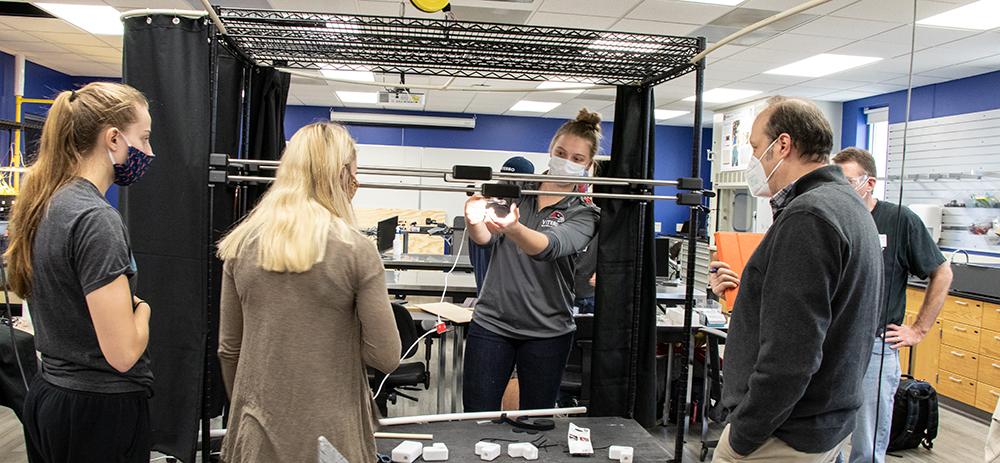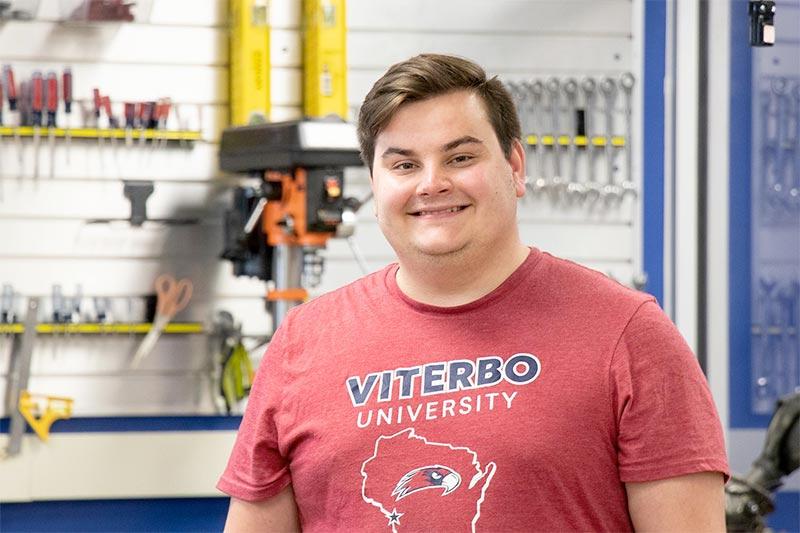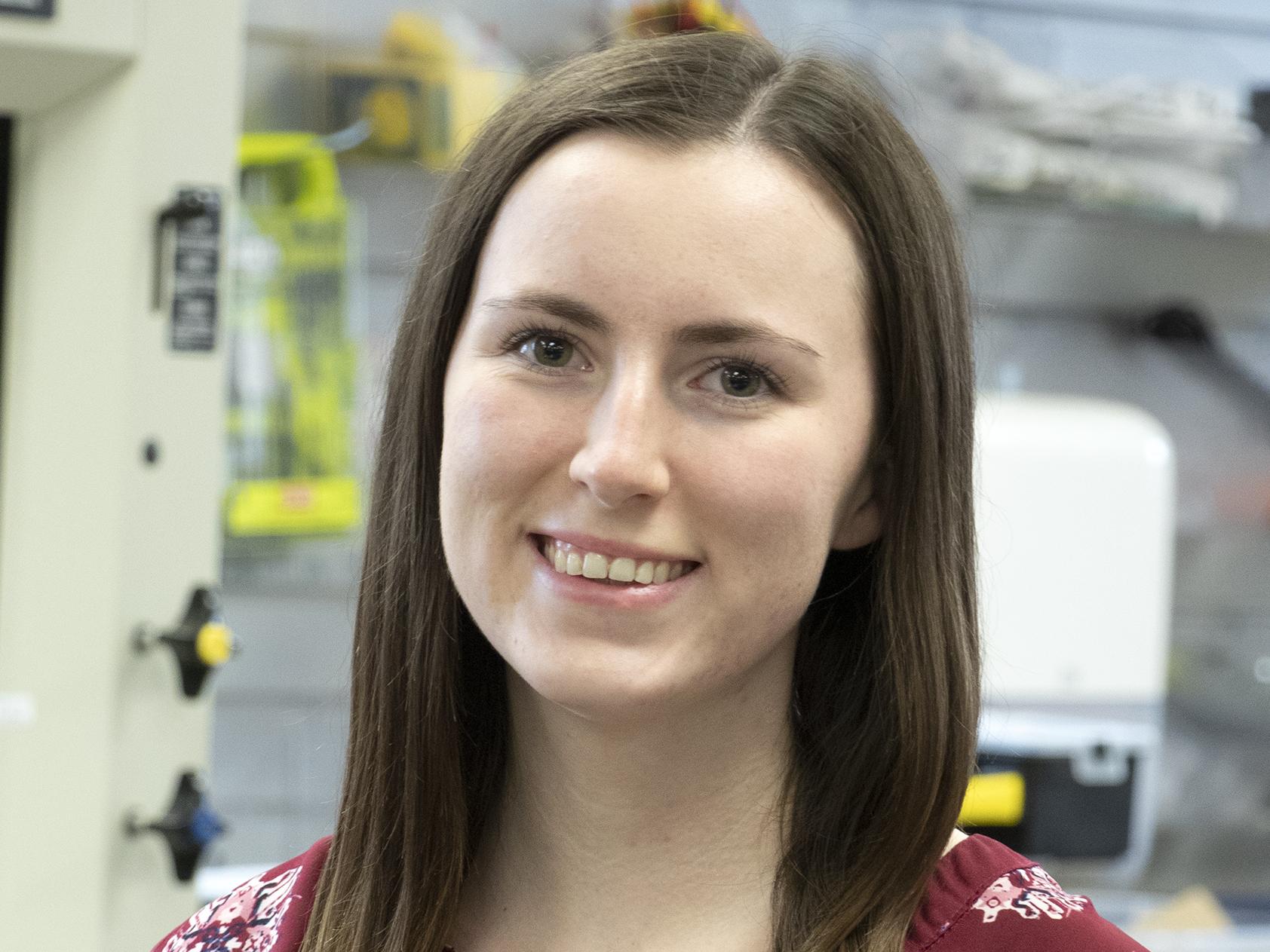Giving a senior capstone project is almost never a cakewalk. But imagine presenting on a senior engineering project when a member of the audience critiquing your presentation was the chief engineer for the U.S. Navy’s X-47B, an unmanned stealth combat aircraft that cost more than $2 billion to develop.
At another university, Keith Carter’s presence might have had students sweating, but Viterbo senior engineering majors Jon Fortney, Gordon Murphy, and Matthew Wejrowski were not rattled in the least. Carter has been a familiar virtual presence for Viterbo students the past four years, giving talks via Zoom to systems engineering and design classes.
So how does Carter, the chief engineer on the award-winning and groundbreaking X-47B project who went on to teach systems engineering for the Naval Air Systems Command, end up involved in Viterbo’s engineering program?
Friendship.
Ric Harned, Viterbo engineering professor, was fresh out of Navy test pilot school and put in charge of a major project. Carter was one of the people Harned chose to work with him on the team, and they formed a strong friendship during their time together.
Years later, when Harned and Emily Vanderfleet were trying to get Viterbo’s engineering program off the ground, Harned turned to Carter for help in creating curriculum for the systems engineering class. Harned has long been a firm believer in systems engineering, an interdisciplinary approach that focuses on designing, integrating, and managing complex projects over their life cycles (birth to obsolescence), but he wanted to ensure that Viterbo’s teaching of systems engineering, normally a graduate level field of study, was top flight.
“When I was in the Navy I was never traditionally trained in systems engineering. I just did it. We all knew the kinds of things we had to do,” Harned said.
A few years ago, Harned got special permission from the Naval Air Systems Command to enroll in Carter’s systems engineering course, and Carter has served as a sounding board as Harned works to improve Viterbo’s instruction.
“It’s been so great to be able to bounce ideas off Keith,” Harned said. “It helps me filter out things I shouldn’t be teaching because they’re too high level.”
After years of lending his expertise from afar, Carter spent a week on campus (March 6–10), which included giving a public lecture on systems engineering and sitting in on the senior capstone presentation. The project involves designing and building a prototype trishaw, a lightweight, pedaled three-wheeled vehicle with seating for two passengers.
The project started last year as part of Viterbo’s HAWK WORKS program, and as with any engineering project, the aim was to solve a problem. A local nursing home had a trishaw for taking residents on rides, but trishaws are hard to get and very expensive, as much as $15,000 with tariffs and shipping costs from Europe.
The three Viterbo seniors working on the trishaw project (Fortney, Murphy and Wejrowski) made great advances this year. At the capstone presentation, they reported they expect to have a working prototype ready for testing by the end of the semester, built at a cost of no more than $9,000.
The cost of manufacturing the trishaw will be significantly less than that per unit. At this point, Murphy explained, they have been paying retail price for most parts, and they’ve had large upfront costs for setting up creation of custom manufactured pieces that won’t have to be paid again.
Carter was impressed with the trio’s work, especially their performance and cost analysis and the way they strategized about securing a supply chain for parts in the future. A big part of success in engineering that most people don’t think of is the importance of building relationships with manufacturers and other suppliers.
“I’ve seen a lot of engineers coming into the workforce who had all the hard skills but were lacking a lot of the soft skills they needed to be successful,” Carter said. “Viterbo’s program does a great job of developing those soft skills.”
Carter noted also was impressed with how much the team consulted with the nursing home recreation director, the ultimate customer for the trishaw. “That’s vital to ensure that what they were creating served their needs,” Carter said. “A lot of times when you get into the design work you forget about what the customer really needs.”
Documentation of risk abatement and mitigation strategies, among other topics, was one area Carter saw need for improvement, especially because another team of Viterbo students will take over the project next fall, ensuring that the vehicle meets all U.S. and international safety regulations and putting it through punishing stress tests to see whether and how it can be broken.
Luckily, there’s time to work on better documentation before the end of the semester, and coming up short is a learning experience, Harned said. “The more you learn, the more you figure out there’s way more out there than you ever knew.”
Between the week he spent at Viterbo and his virtual connections over the past few years, Carter said he has built relationships with the students and has a stake in their success. “I see a lot of depth there,” he said. “I would be disappointed if any one of them would fail, but I don’t think Ric would let that happen.”





